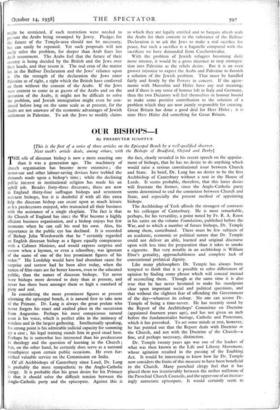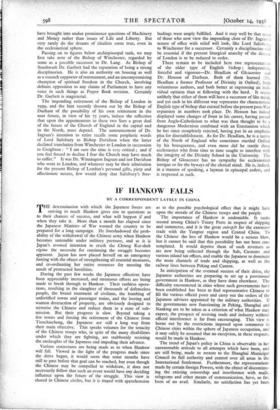OUR BISHOPS -I
By PRESBYTER IGNOTUS
[This is the first of a series of three articles on the Episcopal Bench by a well-qualified observer. Next week's article deals, among others, with the Bishops of Bradford, Oxford and Derby] THE role of diocesan bishop is now a more exacting one than it was a generation ago. The machinery of church organisation has become more extensive ; .the motor-car and other "labour-saving devices have trebled the demands made upon a bishop's time ; while the declining pubic interest in institutional religion has made his an uphill job. Besides forty-three diocesans, there are now in England thirty-four suffragan bishops and seventeen assistant bishops, but it is doubtful if with all this extra help the diocesan bishop can count upon as much leisure as h:s predecessors enjoyed, who transacted all their business with the assistance of a single chaplain. The fact is that the Church of England has since the War become a highly efficient business organisation, and a bishop enjoys but few moments when he can call his soul his own. Also, his importance in the public eye has declined. It is recorded of Bishop John Wordsworth that he " certainly regarded an English diocesan bishop as a figure equally conspicuous with a Cabinet Minister, and would express surprise and sorrow when a layman, or even a schoolboy, was ignorant of the name of one of the less prominent figures of his order." His Lordship would have had abundant cause for surprise and sorrow had he been alive today, when the names of film-stars are far better known, even to the educated public, than the names of diocesan bishops. Yet never were bishops more devoted to duty than at present, and never has there been amongst them so high a standard of piety and zeal.
In considering the more prominent figures at present adorning the episcopal bench, it is natural first to take note of the Primate. Dr. Lang is always the great prelate who never forgets his exact and exalted place in the succession from Augustine. Perhaps his most conspicuous natural asset is his voice, which is perfect alike in the intimacy of wireless and in the largest gathering. Intellectually speaking, his strong point is his admirable judicial capacity for summing up a case ; his legal training stands him in good stead here. Perhaps he is somewhat less interested than his predecessor in theology and the question of learning in the Church ; but, on the other hand, he certainly does serve as a national mouthpiece upon certain public occasions. He even fur- nished valuable service on the Commission on India. • Of all Archbishops of Canterbury since Laud, Dr. Lang is probably the most sympathetic to the Anglo-Catholic clergy. It is probable that his great desire for his Primacy is that it should solve the difficult tension between the Anglo-Catholic party and the episcopate.. Against this is the fact, clearly revealed in his recent speech on the appoint- ment of bishops, that he has no desire to do anything which would raise a serious constitutional issue between Church and State. In brief, Dr. Lang has no desire to be the first Archbishop of Canterbury without a seat in the House of Lords. It seems probable, therefore, that this latter desire will frustrate the former, since the Anglo-Catholic party seems determined to end the connexion between Church and State, and especially the present method of appointing bishops.
The Archbishop of York affords the strongest of contrasts to his colleague of Canterbury. He is most remarkable, perhaps, for his versatility, a point noted by Fr. R. A. Knox in his satire on the volume Foundations, published before the War, and to which a number of future bishops, Dr. Temple among them, contributed. There must be few subjects of an academic, economic or political nature that Dr. Temple could not deliver an able, learned and original discourse upon with less time for preparation than it takes to smoke a cigarette. But very notable in an archbishop is William Ebor's geniality, approachableness and complete lack of conventional prelatical dignity.
Like many philosophers Dr. Temple has always been tempted to think that it is possible to solve differences of opinion by finding some phrase which will conceal instead of reconciling them. Though at the same time it is also true that he has never hesitated to make his standpoint clear upon important social and political questions, and that without the slightest fear of offending the Government of the day—whatever its colour. No one can accuse Dr. Temple of being a time-server. He has recently stood by the Report of the Archbishops' Committee on Doctrine (appointed fourteen years ago), and has not given an inch before the fundamentalist barrage, Catholic and Protestant, which it has provoked. To set some minds at rest, however, he has pointed out that the Report deals with Doctrine in the Church, and not with the Doctrine of the Church—a fine, ar.d perhaps necessary, distinction.
Dr. Temple twenty years ago was one of the leaders of what was then known as the Life and Liberty Movement, whose agitation resulted in the passing of the Enabling Act. It would be interesting to know how far Dr. Temple now considers the fruits of this measure to have been beneficial to the Church. Many parochial clergy feel that it has placed them too irretrievably between the nether millstone of the Parochial Church Councils, and the upper one of an increas- ingly autocratic episcopate. It would certainly seem to have brought into undue prominence questions of Machinery and Money rather than issues of Life and Liberty. But very rarely do the dreams of idealists come true, even in the ecclesiastical sphere.
Passing on to figures below archiepiscopal rank, we may first take note of the Bishop of Winchester, regarded by some as a possible successor to Dr. Lang. As Bishop of Southwark Dr. Garbett had the reputation of being a strong disciplinarian. He is also an authority on housing as well as a staunch supporter of rearmament, and an uncompromising champion of spiritual freedom in the Church, involving definite, opposition to any claims of Parliament to have any voice in such things as Prayer Book revision. Certainly Dr. Garbett is magisterial.
The impending retirement of the Bishop of London in 1939, and the hint recently thrown out by the Bishop of Durham of the possibility of his own retirement in the near future, in view of his 75 years, induce the reflection that upon the appointments to these two Sees a great deal of the future of the Church of England in the capital and in the North, must depend. The announcement of Dr. Ingram's intention to retire recalls some prophetic words of Lord Salisbury to Bishop Davidson when the latter declined translation from Winchester to London in succession to Creighton : " I am sure the time is very critical; and if you feel forced to decline I fear the Church may have much to suffer." It was Dr. Winnington Ingram and not Davidson who went to London, and whatever may be their admiration for the present Bishop of London's personal gifts, piety and affectionate nature, few would deny that Salisbury's fore- bodings were amply fulfilled. And it may well be that some of those who now view the impending dose of Dr. Ingram's tenure of office with relief will look, like Lord Salisbury, to Winchester for a successor. Certainly a disciplinarian will be essential if the present liturgical anarchy of the diocese of London is to be reduced to order.
There remain to be included here two representati \ es of the older type of English bishop ; independent, forceful and vigorous—Dr. Headlam of Gloucester and Dr. Henson of Durham. Both of them learned (Dr. Headlam a former Professor of Divinity in Oxford), both voluminous authors, and both better at expressing an indi- vidual opinion than at following with the herd. It seems unlikely that either of them will have a successor of like mind, and yet each in his different way represents the characteristic English type of bishop that existed before the present post-War expansion in numbers took place. Dr. Henson has indeed displayed some changes of front in his career, having passed from Anglo-Catholicism to what was then thought to be a dangerous Modernism combined with an Erastianism which he has since completely rejected, having put in an emphatic plea for disestablishment. As for Dr. Headlam, he is a native of the North of England who sometimes startled Oxford by his brusqueness, and even more did he startle those ecclesiastics who from time to time sought to interfere with the integrity of the Divinity School in the University. The Bishop of Gloucester has no sympathy for ecclesiastical intrigue or for the byways of the clerical mind. He is, indeed, in a 'manner of speaking, a layman in episcopal orders, and is respected as such.



















































 Previous page
Previous page